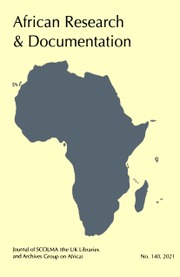No CrossRef data available.
Article contents
Africa And The New World Information Order Monopolisation of Information and Implications for Finance Capital; Strategies for the Indigenisation of Information and Knowledge
Published online by Cambridge University Press: 25 April 2022
Extract
This paper sets out a research agenda for the analytical study of the monopolisation of information and the implications for finance capital, by examining the processes and strategies that can be implemented to democratise information . through the use of information technologies such as compact disk read only memory, desk top publishing, scanners, modems and computers in order to collect African based information and knowledge in the form of databases that can be net-worked across the continent. The main idea is to develop Africa’s information capacity by building upon its existing socio-political, economic, cultural, scientific and technological base, in a manner that makes it possible for African knowledge to be developed further.
- Type
- Articles
- Information
- Copyright
- Copyright © African Research & Documentation 1992
Footnotes
Shortened version of a paper presented at the African Association of Political Science Conference on Africa and the New World Order, Nairobi, Kenya, May 1992.
Each generation must, out of relative obscurity, discover its mission, fulfil it, or betray it. In under-developed countries the preceding generations have both resisted the work of erosion carried on by colonialism and also helped the maturing of the struggles of today. We must rid ourselves of the habit, now that we are in the thick of the fight, of minimizing the actions of our fathers or of feigning incomprehension when considering their silence and passivity. They fought as well as they could, with the arms that they possessed then; and if the echoes of their struggle have not resounded in the international arena, we must realize that the reason for this silence lies less in their lack of heroism than in the fundamentally different international situation of our time. It needed more than just one native to say “We’ve had enough “; more than one peasant rising crushed, more than one demonstration put down before we could today hold our own, certain in our victory. As for us who have decided to break the back of colonialism, our historic mission is to sanction all revolts, all desperate actions, all those abortive attempts drowned in rivers of Blood.




